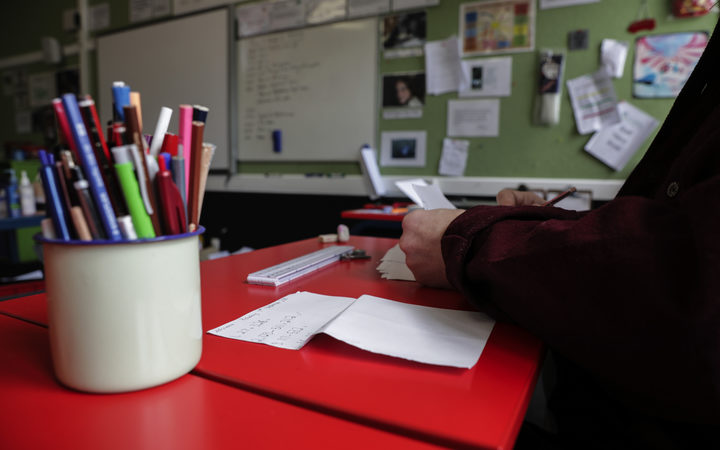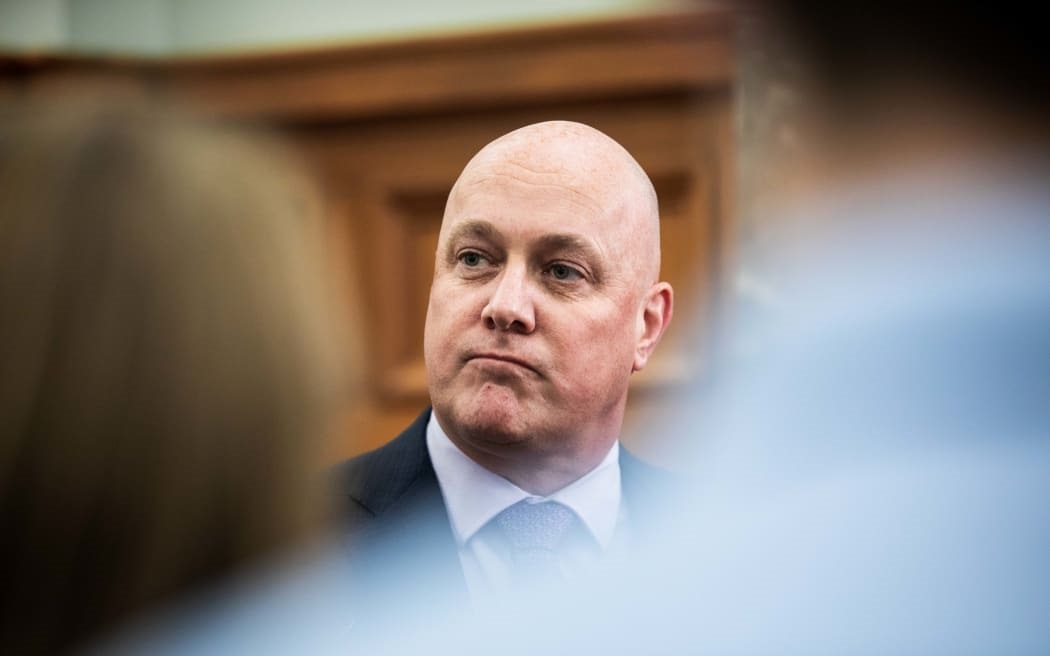
He said the party would set a target of 80 percent of students at or above the expected curriculum level for their age by 2030, with New Zealand in the top 10 in the world on PISA rankings for maths, reading and science by 2033.
Luxon told media this afternoon his party would chart a "positive course for New Zealand that's not about left or right, but about going forwards instead of backwards and it's about delivering results and outcomes".
He said it would do this with its Teaching the Basics Brilliantly plan. The policy involves children spending an hour on average per day on reading, writing and maths - similar to the 'Back on track' policy announced in 2021.
It would shift the curriculum from two-to-three year 'bands' of requirements to year-specific.
The plan would also involve "standardised, robust" twice-a-year testing of reading, writing and maths ability from Year 3 to Year 8, with detailed reports for parents.
Teacher registration fees would also be scrapped.
A centralised library of resources for teachers to create lessons from would be created, while the party would also introduce an exit exam for primary and intermediate teaching graduates covering expertise in reading, writing, maths and science instruction, and require current teachers to do professional development in "teaching the basics".
Luxon said he saw the effect of a lack of resources available for teachers with his teacher wife Amanda.
"She spent endless evenings and weekends preparing the lesson plans, when in fact having a central repository as we see in many other countries that a teacher can go to there as a starting point, get 70, 80 percent of what they kind of want to do, add their localised content on top and their own perspective on top of it to tailor it to their kids. That's a great way for them to do it."
It would mean they would not have to spend "endless time doing stuff you don't need to be doing", he said.

Luxon said his own life had been grounded in being taught "the basics incredibly well by some outstanding teachers in the New Zealand state school system".
But the current state of education in New Zealand was "alarming", with achievement declining over the past 30 years or so across multiple governments, he added.
"A recent pilot of an NCEA reading, writing and maths assessment revealed that two-thirds - two thirds - of secondary school students failed to reach the minimum level that the OECD says is absolutely necessary to succeed in further learning, life, and work.
"And worse, the school system's ineffectiveness is most pronounced in low-income areas, with just 2 percent of Decile One high school students able to pass a basic writing test, and just 10 percent able to pass maths. But all school levels are going backwards."
He said remote learning during Covid-19 exposed parents to the school system's lack of focus on the basics.
Teachers, pupils and school were not responsible for educational decline, and those structural issues that were needed to be addressed, Luxon said.
An example was banding of the curriculum, which meant New Zealand children start learning addition and subtraction any time between Year 2 and Year 5, compared to in England and Australia where children start learning it at Year 1, he said.
He pointed to a study by the Royal Society, which he said found nearly half of Year 4 student teachers felt only moderately confident in teaching maths, so were scheduling less class time on it.
The current educational slump was partly the result of the national curriculum's insufficient direction and a willingness to be led "by ideas and ideology, rather than evidence and science, and a complete lack of system accountability", Luxon said.
"The evidence shows that if you're failing in Year 8 - that last year of intermediate school - , you're going to struggle through high school and perhaps you'll simply give up and stop going.
"I want an end to children giving up on school because it gives them no sense of belonging, no sense of purpose or no sense of satisfaction, and I want an end to good teachers quitting out of exhaustion and frustration, because the system isn't helping them or their pupils get ahead."
National will be unveiling more education policies over the coming months, the party leader said.
"We will not accept mediocrity in the school system. The social costs and the economic costs for New Zealand are simply too high for failure," Luxon said.
Yesterday, National announced it would rewrite the school curriculum, saying it wanted to determine which skills were non-negotiable at each year of primary and intermediate in reading, writing, maths and science.
The policy drew backlash from some educators; one of whom said it was a reiteration of the National Standards, which they did not believe to be successful, and another said they were not convinced by a lock-step approach.
The Green Party called it an expensive distraction, and ACT welcomed the move but said it would need to focus on actual improvements.
Labour leader Chris Hipkins believed the two parties could work together to reach bipartisan consensus on a solution to improve foundation skills for children.











